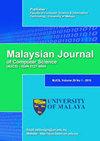推特用户情绪检测的两步模型:马来西亚COVID-19案例研究
IF 1.2
4区 计算机科学
Q4 COMPUTER SCIENCE, ARTIFICIAL INTELLIGENCE
引用次数: 4
摘要
人类的情感往往是一个人的行为的反映,导致意识到一个人的心理健康。推特用户的情绪检测尤其受到关注,因为它产生的信息在心理学和语言学领域很有用。然而,现有的与该学科相关的作品大多是根据推文中关键词或短语的数量来分析推文的情绪,从而导致错误的注释,最终导致对用户情绪的错误判断。本文提出了一种准确率高、可靠的两步模型,基于推文的语义对推特用户的情绪进行检测。第一步使用四种不同的深度学习技术对每条推文的情绪进行分类。第二步基于提出的统计后级特征和增强技术检测用户的情感。然后采用Kappa协议评分法对两种模型进行验证。第一步的准确率为0.9482,第二步的准确率为0.9683。为了进一步验证这一高度准确的结果,我们进行了案例研究,并开发了一个基于网络的系统来分析新冠肺炎大流行期间大学生的情绪。此外,我们的分析与目前大多数关于大流行的报告相符,这进一步证明了所开发模型的可靠性。本文章由计算机程序翻译,如有差异,请以英文原文为准。
TWO-STEP MODEL FOR EMOTION DETECTION ON TWITTER USERS: A COVID-19 CASE STUDY IN MALAYSIA
Human emotion is often a reflection of one’s behaviour that leads to awareness of one’s mental health. Emotion detection on Twitter users specifically gains attention as it generates information that is useful in the field of psychology and linguistics. However, most existing works related to the subject analysed the emotion of a tweet based on the number of keywords or phrases in it, thus resulting in false annotations and eventually false judgement of the user’s emotion. This paper proposes a two-step model with high and reliable accuracy to detect the emotion of Twitter users based on the semantic meaning of the tweets they posted. The first step classified the emotion of each tweet using four different deep learning techniques. The second step detected the emotion of the user based on the proposed statistical post-level features and a boosting technique. Then, Kappa’s agreement score method was implemented to validate both models. The first step achieved 0.9482 in accuracy while the second step achieved 0.9683 in accuracy. To further validate such highly accurate result, a case study was conducted, and a web-based system was developed to analyse the emotion of college students during the COVID-19 pandemic. Additionally, our analysis corresponded to most of the current reports on the pandemic which further proved the reliability of the developed model.
求助全文
通过发布文献求助,成功后即可免费获取论文全文。
去求助
来源期刊

Malaysian Journal of Computer Science
COMPUTER SCIENCE, ARTIFICIAL INTELLIGENCE-COMPUTER SCIENCE, THEORY & METHODS
CiteScore
2.20
自引率
33.30%
发文量
35
审稿时长
7.5 months
期刊介绍:
The Malaysian Journal of Computer Science (ISSN 0127-9084) is published four times a year in January, April, July and October by the Faculty of Computer Science and Information Technology, University of Malaya, since 1985. Over the years, the journal has gained popularity and the number of paper submissions has increased steadily. The rigorous reviews from the referees have helped in ensuring that the high standard of the journal is maintained. The objectives are to promote exchange of information and knowledge in research work, new inventions/developments of Computer Science and on the use of Information Technology towards the structuring of an information-rich society and to assist the academic staff from local and foreign universities, business and industrial sectors, government departments and academic institutions on publishing research results and studies in Computer Science and Information Technology through a scholarly publication. The journal is being indexed and abstracted by Clarivate Analytics'' Web of Science and Elsevier''s Scopus
 求助内容:
求助内容: 应助结果提醒方式:
应助结果提醒方式:


